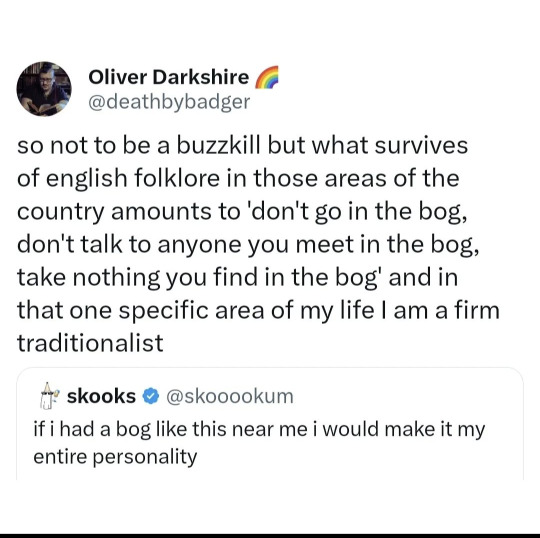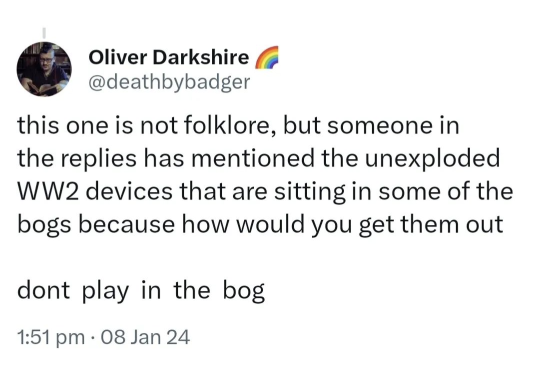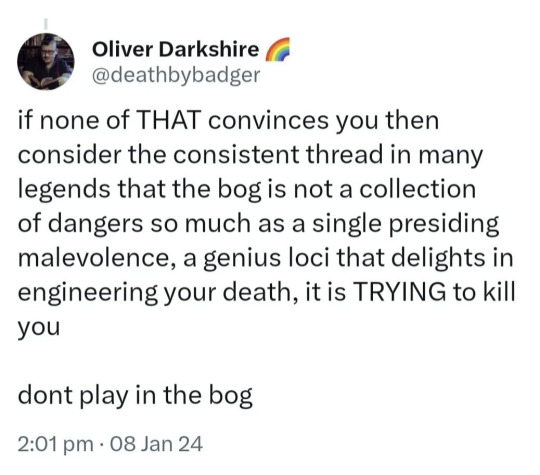#- english.
Explore tagged Tumblr posts
Text
This is from. It's. Well. Erm.

Honey, do I really need to correct a fucking university about this.
11 notes
·
View notes
Text
youtube
Today's song is Cum Peccato Natus Sum by Peeak featuring SynthV Haruno Sora
2 notes
·
View notes
Text

98K notes
·
View notes
Text
you can pry starting sentences with 'and' or 'but' out of my cold, dead hands
#writing#writblr#i dont care if it's improper im gonna do it anyway#it just feels right a lot of the time#my goal in writing isnt to be a master of the english language but to portray a feeling and a lot of our feelings are imperfect#writeblr
118K notes
·
View notes
Text










62K notes
·
View notes
Text
the problem with reading and writing leading to a strong vocabulary is that you tend to know the vibe of words instead of their meanings.
if I used this word in a sentence, would it make sense? absolutely. if you asked me what it meant, could I tell you? absolutely not.
#someone send this to my english teacher because vocab tests are hard#writing memes#reading#writers#writers of tumblr#writers of instagram#writing#writer#reader#writer memes#readers of tumblr
165K notes
·
View notes
Text

https://nationalpost.com/news/canada/theyre-not-human-how-19th-century-inuit-coped-with-a-real-life-invasion-of-the-walking-dead
Indigenous groups across the Americas had all encountered Europeans differently. But where other coastal groups such as the Haida or the Mi’kmaq had met white men who were well-fed and well-dressed, the Inuit frequently encountered their future colonizers as small parties on the edge of death.
“I’m sure it terrified people,” said Eber, 91, speaking to the National Post by phone from her Toronto home.
And it’s why, as many as six generations after the events of the Franklin Expedition, Eber was meeting Inuit still raised on stories of the two giant ships that came to the Arctic and discharged columns of death onto the ice.
Inuit nomads had come across streams of men that “didn’t seem to be right.” Maddened by scurvy, botulism or desperation, they were raving in a language the Inuit couldn’t understand. In one case, hunters came across two Franklin Expedition survivors who had been sleeping for days in the hollowed-out corpses of seals.
“They were unrecognizable they were so dirty,” Lena Kingmiatook, a resident of Taloyoak, told Eber.
Mark Tootiak, a stepson of Nicholas Qayutinuaq, related a story to Eber of a group of Inuit who had an early encounter with a small and “hairy” group of Franklin Expedition men evacuating south.
“Later … these Inuit heard that people had seen more white people, a lot more white people, dying,” he said. “They were seen carrying human meat.”
Even Eber’s translator, the late Tommy Anguttitauruq, recounted a goose hunting trip in which he had stumbled upon a Franklin Expedition skeleton still carrying a clay pipe.
By 1850, coves and beaches around King William Island were littered with the disturbing remnants of their advance: Scraps of clothing and camps still littered with their dead occupants. Decades later, researchers would confirm the Inuit accounts of cannibalism when they found bleached human bones with their flesh hacked clean.
“I’ve never in all my life seen any kind of spirit — I’ve heard the sounds they make, but I’ve never seen them with my own eyes,” said the old man who had gone out to investigate the Franklin survivors who had straggled into his camp that day on King William Island.
The figures’ skin was cold but it was not “cold as a fish,” concluded the man. Therefore, he reasoned, they were probably alive.
“They were beings but not Inuit,” he said, according to the account by shaman Nicholas Qayutinuaq.
The figures were too weak to be dangerous, so Inuit women tried to comfort the strangers by inviting them into their igloo.
But close contact only increased their alienness: The men were timid, untalkative and — despite their obvious starvation — they refused to eat.
The men spit out pieces of cooked seal offered to them. They rejected offers of soup. They grabbed jealous hold of their belongings when the Inuit offered to trade.
When the Inuit men returned to the camp from their hunt, they constructed an igloo for the strangers, built them a fire and even outfitted the shelter with three whole seals.
Then, after the white men had gone to sleep, the Inuit quickly packed up their belongings and fled by moonlight.
Whether the pale-skinned visitors were qallunaat or “Indians” — the group determined that staying too long around these “strange people” with iron knives could get them all killed.
“That night they got all their belongings together and took off towards the southwest,” Qayutinuaq told Dorothy Eber.
But the true horror of the encounter wouldn’t be revealed until several months later.
The Inuit had left in such a hurry that they had abandoned several belongings. When a small party went back to the camp to retrieve them, they found an igloo filled with corpses.
The seals were untouched. Instead, the men had eaten each other.
#being so English you die of racism#because youd rather eat each other than a seal#or try to signal to the friendly locals that you need help#many such cases#UNIRONICALLY#the terror#the franklin expedition#dorothy eber#then they infected all these people with European disease of course#the national post is a chud rag so this is an unexpectedly good article for them
58K notes
·
View notes
Text

#love quotes#poetry#poem#dark academia#light academia#quotes#romance#love poem#romantic academia#memes#english literature#literary quotes#writers on tumblr#spilled ink#inspiring quotes#life quotes#spilled thoughts#ink#art#thoughts#facts#quoteoftheday#literature#written#cottage aesthetic#cottagecore#poems and poetry
67K notes
·
View notes
Text












"You just have to look closely."
#anyway how we're feeling with this last episode folks#my art#tadc#fanart#the amazing digital circus#art#i had been meaning to draw this comic for a while but never had the energy for it#i got a burst of inspiration from the episode#tadc fanart#tadc kinger#tadc queenie#kinger x queenie#tadc episode 3#tadc spoilers#kinger tadc#kinger#btw sorry for any gramatical mistakes english aint my first language my bad#comic#tadc comic#i don't know if kinger and his wife knew each other before the circus but going with the yes option just because
26K notes
·
View notes
Text



Clan head!Gojo
#gojo x you#gojo x reader#gojo smut#gojo satoru#jjk fanart#english is not my first language if anything sounds weird im sorry pls pretend it makes sense#gojo satoru smut
30K notes
·
View notes
Text
bro i LOVE indigenous fusion music i love it when indigenous people take traditional practices and language and apply them in new cool ways i love the slow decay and decolonisation of the modern music industry
#but also !!!!!!! indigenous people who make traditional music and release it !!!!! just as cool !!! equally as valid !!!!!!!!!!! indigenous#people who just release in english/the main language of their country are also very cool !!!!!! more love and focus on the art of#indigenous ppl !!!!!!!!#anyway i have been on a big Inuit pop/indie fusion kick lately#i've also been meaning to do a deep dive into the Blak (indigenous australian) music scene#anyway ! :3#music#words of wyrm
42K notes
·
View notes
Text
youtube
Today's song is Interstellar SOS by GloopBloop, featuring SynthV Kasane Teto and Eleanor Forte
#gloopbloop#original.#synthesizer v#english.#synthv#kasane teto#eleanor forte#everydayvocaloid#Youtube
15 notes
·
View notes
Text
I confuse people. i have a happy personality and a sad soul. i'm bold but shy. i love deeply but sometimes i feel heartless. i'm healing and hurting at the same time. i'm dedicated to growth, but i self sabotage
#love quotes#unknown#known#romance quotes#quotes#inspirational quotes#life quotes#inspiring quotes#writers on tumblr#writing#writers and poets#friends#friendship#mental health#heartbreak#daily quotes#daily qoute#beautiful#beautiful words#literature#lit#english literature#life#life quote motivation#motivation#motivating quotes#self love#lovers#politics#autumn
22K notes
·
View notes
Text
Here’s my take on the whole audio books vs. reading:
Oral tradition of storytelling predates written ones by millennias, and honestly, which one you like is just a personal preference.
The actual difference is
when listening, you have no idea how to write characters’ names
when reading, you have no idea how to pronounce characters’ names
hope this helps!
#audio books vs reading#honestly this debate is just pineapple on pizza again#personally i like reading better#i’m a poor listener and since i read faster than people talk i get bored and my mind starts to wander#but who gives a shit#just do what works best for you#in the end we all get the same story#oh and this post is about stories in english#in finnish you rarely have either problem
30K notes
·
View notes
Text

46K notes
·
View notes